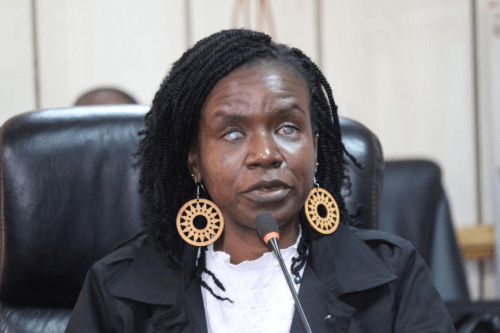Crystal Asige slams matatu operators for neglecting PWDs’ needs

Nominated Senator Crystal Asige, a vocal advocate for the rights of persons with disabilities (PWDs), on Tuesday, May 20, 2025, strongly condemned matatu owners and other transport operators who have failed to comply with the Persons With Disabilities (PWDs) Act 2025.
In her argument, Asige, who was nominated by the Orange Democratic Movement (ODM), emphasised that the rules should apply to other modes of transport, including rail, air, sea, and even pedestrian infrastructure.
“What good is ‘public’ transport if a significant section of the public cannot use it?” Asige posed in a strongly worded statement. “If your vehicle or transit station can’t serve persons with disabilities, you are now non-compliant.”
“All transport modes must be safe, dignified, and accessible to all types of users with disabilities,” she stated, urging sector players to adhere to the law and prioritise inclusive design in all transport infrastructure.

The PWDs Act 2025 enshrines the right of PWDs to barrier-free access across all facets of public infrastructure, including roads, buildings, and transport systems.
According to the Act, the National Council for Persons With Disabilities (NCPWD) holds the mandate to compel non-compliant transport operators to make their services accessible. This includes matatus, SACCOs, and bus companies.
“The National Council for Persons With Disabilities can order transport operators to remove barriers and make their services more accessible to passengers with disabilities,” Asige quoted the law while warning non-compliant PSV operators.
Incentive to compliers
To encourage compliance, the law also introduces a financial incentive. Public transport owners who upgrade their vehicles to meet accessibility standards can claim up to 25 per cent of the modification costs from the National Treasury.
“Public transport vehicles are incentivised to accommodate persons with disabilities, as per standards set by the NCPWD,” she explained. “Those who comply can now claim 25 per cent of modification costs from the Ministry of Finance.”
Asige concluded by stressing the importance of universal design standards in both new and existing transport infrastructure. She reminded stakeholders that non-compliance could result in denial of approval or occupation for new transport projects, including both permanent and emergency structures.
“New public and private transport infrastructure must now comply with universal design standards or be denied approval and occupation,” she stated.
According to Asige, it is disappointing that persons with disabilities are still given little attention despite an act being in place to protect them. Most matatus and transport systems still lack accessibility features, even though they constitute a significant portion of the population.














